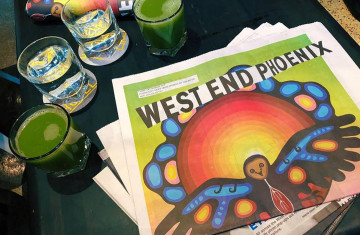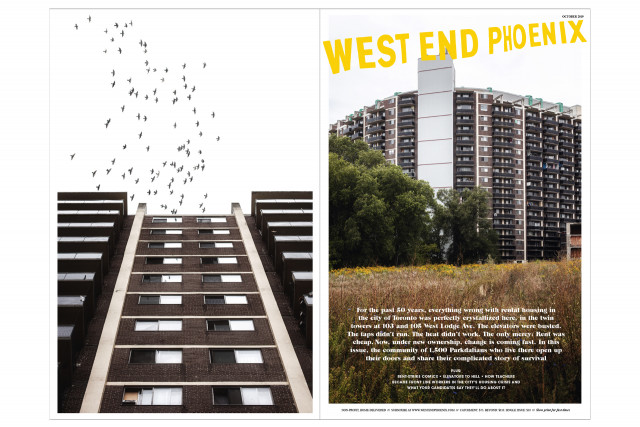How a local paper thrives while newspaper giants tank
Author and musician Dave Bidini explains why he decided to launch a new community newspaper in 2017, and how, as the West End Phoenix’s publisher, editor and subscription pitchman, he and his team have kept it going in an era when larger papers are declining.

The West End Phoenix just celebrated its third birthday, in a climate where journalism is in decline.
It’s been an awful few years—going on an awful decade—for journalism, scarred by Donald Trump and Fox News’ Fake News propaganda, Facebook’s storm of truthless literature and the inability of most legacy print media to pivot into the digital kingdom. Writers have lost their jobs en masse, newsrooms have been eviscerated and the inability to earn a living in a time of declining compensation has forced journalism grads into communications and PR jobs. Papers are smaller, and even digital portals are less robust. These body blows have bruised, if not defeated, the vocation.
Throughout all of this, and despite those rain clouds, a small group of us started the West End Phoenix, a community print newspaper for Toronto’s neighbourhood that stretches from Spadina to the Humber River, and from Eglinton to the lake—although ours is a porous border, serving readers to the east and, in many cases, across Canada, too.
The mere act of starting a newspaper is political. It’s a gesture in support of democracy, a free press and storytelling.
The idea was born out of a summer I spent in Yellowknife working for the Yellowknifer newspaper, a thriving city press. When I arrived back in Toronto, I discovered that most of our longstanding community papers here had been bought by Metroland publishing and turned into glorified flyers, lacking any deep content. So I went door to door and sold 800 subscriptions before we printed a single issue. Now here we are, three years later, and we are raging on.
People ask what our politics are at West End Phoenix, and I tell them that the mere act of starting a newspaper is political. It’s a gesture in support of democracy, a free press and storytelling. Our readers, I think, are divided into people who are engaged in community activism and those who want a more tactile and living experience with their news; a place where they can exist off their phones and spend a few hours lost in the pages. We’ve built a small, but thriving, community where delivery volunteers know their readers on their route, and where our contributors are celebrated for where they live.
WEP has brought readers and writers together, and neighbourhoods have grown because we employ some of Canada’s greatest writers to write about where we live, reinventing what a community newspaper can and should be in 2020. We want people to read it the way I once read the LA Weekly or the Village Voice: I didn’t live on St. Mark’s, but the stories and writing about it were too good not to read. We’re hoping the same holds true with Heidi Sopinka writing about the chickens of Davenport Road or Ryan McMahon writing about the Sherbourne Street sweat lodge or Michael Winter writing about Vesta Lunch. We pay all of our contributors industry standard amounts, despite getting zero government or granting support.
We rely on patrons and donors for our revenue, plus our approximately 2,000 subscribers, although we need to increase that number to have a chance to sustain our existence beyond three years. We are seeing the paper grow, but part of my job as publisher over the next few weeks and months is to compel readers who are curious and interested in the paper to jump aboard and sign up for home delivery or mail service (we mail everywhere in the world).
We also run events that help hold up our model: raising money through one-of-a-kind concerts at George Stroumboulopoulos’ House of Strombo and readings with Margaret Atwood (an early supporter) and Claudia Dey (a regular contributor). Last May, we had 500 subscribers come out and celebrate at the Junction Brewery, where we staged a Double-Or-Nothing rock show with Alex Lifeson, Chris Walla, Sarah Harmer and Terra Lightfoot doing duets. Who knew that journalism in 2019 could actually be fun?
We employ some of Canada’s greatest writers to write about where we live, reinventing what a community newspaper can and should be.
It’s a struggle to spread the word about who we are and what we do because we have zero capacity for advertising and marketing, so we rely on lawn signs and word of mouth, plus bombarding social media whenever we have a new issue or event coming up. But it’s small steps. We want to keep supporting writers, photographers and illustrators, and we want to keep providing strong community journalism in a time when it’s harder and harder to find quality local reporting—but it’s what we do, and it’s what drives us. With the Metro papers having been shut down and NOW sold to penny-stock investors, we want to be able to step into the breach when and if required.
People see this, I think, and in the first week of December we had the greatest swell of new subscribers in the history of the paper. Here’s hoping it continues.


